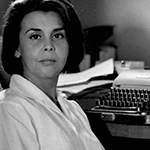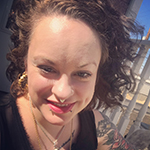Midday
for José María Arguedas
Everything is ready for the sacrifice.
The cow moos in the adobe temple.
Harsh red tear,
rubble in flames,
silence and the strong scent of sunflower,
of crowned roosters.
Not one leaf will fall,
only the species falls,
and the fruit falls, poisoned by the air.
There is no center,
all these faces in stone
are horrible flowers,
messy stars, without will.
Not one hour of peace in this immense day.
The light devours its portion so cruelly.
The sea is distant and alone,
the earth, impure and vast.
Letter
for N.
Open fruit unspoiled by the air,
undented blade, never blackened,
the blood flows towards you
and returns without danger,
without bridges,
thought rests within you.
Sundial,
noble hue,
the summer of my house,
for your sake the wolf is educated
and the rodent returned to its nest.
Sister,
your white face, closed
with no discernible history,
you, the very one, immobile,
pure ideal.
Eve Leaves
animal of salt
if you turn the head
on your body
you will become
and you will have a name
and the word
slithering
will be your mark
Translator’s Note:
In addition to translating Spanish-language poetry, I am a poet myself. Blanca Varela’s poetry is surrealist and lyric rather than narrative, and I think that only a lyric poet could translate her work with any real authenticity. There’s no such thing as a 1:1 translation, but I believe a translation can come close to a kind of equivalency if it maintains this authenticity along with the integrity of the piece. I’ve done my best to do that here, with Varela’s poetry.
I first came across Varela’s work when I was studying at the Pontifical Catholic University of Peru (La PUCP) in 2011. I purchased her final collection, Concierto animal (Animal Concert), from the university bookstore and was immediately captivated by her stark honesty and her uncanny manner of truth-telling. The stanza that first really got me was from her poem “esta mañana” (“this morning”): “this morning I am other / all night / the wind gave me wings / to fall”.
Over the last 14 years, I’ve acquainted myself with more and more of Varela’s work, and a few years ago I began translating some of her poems, just for my own enjoyment, when I realized that few English translations existed of her work. Varela, who is now well known in Peru and other parts of South America, initially had to be championed by a man: Octavio Paz. The idea of introducing more Latin American women writers to English-speaking audiences galvanized me and my translation work.
Varela’s work is a fascinating challenge for a translator. In many of her poems she uses no punctuation or capital letters, and the syntax can be tricky to unpack; however, I actually find those poems easier to work with. The main reason for this is that it gives me more leeway to play around with line breaks. This may not sound like a big deal but it makes the translating job much freer (if that makes any sense)! The other big challenge is simply that the imagery she uses is so unique, so precise and sharp, that it’s quite the creative process to try to “match” it as well as possible in another language.
If these pieces speak to you, please share them! Varela was a singular writer and deserves much wider acclaim than she currently enjoys.

Blanca Varela (1926-2009) was a surrealist poet born in Lima, Peru. With contemporary fellow Peruvian poets, she sparked a national poetry movement known as “la Generación del 50.” Her early work was championed by Octavio Paz, who wrote the introduction to Varela’s first volume of poetry, Ese puerto existe (That Port Exists, 1959). Varela has been honored with myriad awards, including the Octavio Paz Prize for poetry in 2001, the Federico García Lorca City of Granada International Poetry Prize in 2006, and Spain’s Queen Sofia Prize for Ibero-American Poetry in 2007. Despite this acclaim, she has not yet been translated extensively into English.

Liana Kapelke-Dale (she/her) is a queer and disabled poet, ATA-Certified Translator (Spanish to English), and mixed-media artist. Her translations of Peruvian poet Blanca Varela’s work have appeared or are forthcoming in The New England Review, Poet Lore, Contemporary Verse 2, december magazine, and The Los Angeles Review. Liana has authored a full-length collection of poetry, Seeking the Pink (Kelsay Books), as well as two poetry chapbooks. She holds a BA in Spanish Language and Literature and a Certificate in Latin American and Caribbean Studies from the University of Wisconsin-Milwaukee, and a JD from the University of Wisconsin Law School.

 BACK TO ISSUE
BACK TO ISSUE